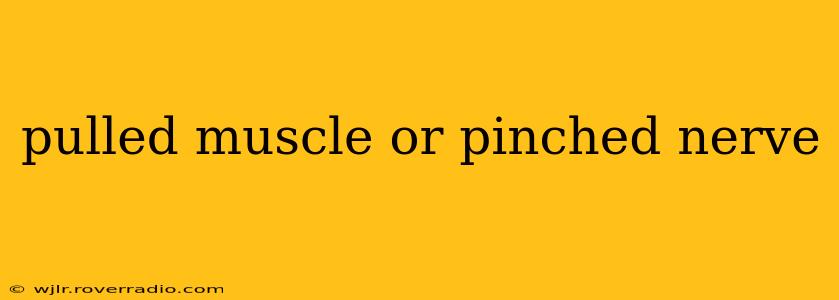Experiencing sudden pain in your back, neck, or limbs can be incredibly debilitating. Two common culprits are pulled muscles and pinched nerves. While both cause significant discomfort, understanding their differences is crucial for proper diagnosis and treatment. This comprehensive guide will help you distinguish between a pulled muscle and a pinched nerve, explore common symptoms, and outline effective relief strategies.
What is a Pulled Muscle?
A pulled muscle, also known as a muscle strain, occurs when muscle fibers are overstretched or torn. This often happens due to sudden movements, overuse, or strenuous activity. The severity of a pulled muscle can range from mild discomfort to severe pain, depending on the extent of the damage.
Symptoms of a Pulled Muscle:
- Sharp pain: Initially, you might experience a sharp, stabbing pain in the affected area.
- Muscle tenderness: The muscle will be sore to the touch.
- Muscle spasm: Involuntary contractions of the muscle can occur.
- Limited range of motion: You may find it difficult to move the affected area fully.
- Swelling and bruising: In more severe cases, swelling and bruising might develop.
What is a Pinched Nerve?
A pinched nerve, also known as a compressed nerve, occurs when surrounding tissues, such as bones, muscles, or ligaments, put pressure on a nerve. This pressure can disrupt the nerve's function, leading to pain, numbness, tingling, and weakness. Pinched nerves can occur anywhere in the body, but are common in the neck (cervical radiculopathy) and lower back (lumbar radiculopathy).
Symptoms of a Pinched Nerve:
- Radiating pain: Pain often radiates along the nerve's pathway, extending down the arm or leg.
- Numbness and tingling: These sensations are frequently described as "pins and needles" or a burning feeling.
- Weakness: Muscle weakness in the affected area is common.
- Shooting pain: Sudden, sharp pains that travel along the nerve's path.
Pulled Muscle or Pinched Nerve: How to Tell the Difference?
Differentiating between a pulled muscle and a pinched nerve can be challenging, as their symptoms can overlap. However, some key distinctions can help:
- Location of Pain: Pulled muscle pain is typically localized to the affected muscle, whereas pinched nerve pain often radiates along the nerve's pathway.
- Type of Pain: Pulled muscle pain is often described as aching or throbbing, while pinched nerve pain can be sharp, shooting, or burning.
- Numbness and Tingling: Numbness and tingling are more common with pinched nerves than with pulled muscles.
- Weakness: Muscle weakness is a strong indicator of a pinched nerve.
How Are Pulled Muscles and Pinched Nerves Treated?
Treatment for both pulled muscles and pinched nerves often involves a combination of conservative approaches:
- Rest: Avoiding activities that aggravate the pain is crucial.
- Ice: Applying ice packs to the affected area can help reduce inflammation and pain.
- Heat: After the initial inflammation subsides, heat therapy can help relax muscles.
- Over-the-counter pain relievers: Medications like ibuprofen or acetaminophen can help manage pain and inflammation.
- Physical therapy: A physical therapist can guide you through exercises to strengthen muscles, improve flexibility, and restore range of motion.
What are the long-term effects of a pulled muscle?
Most pulled muscles heal within a few weeks with proper rest and treatment. However, neglecting a severe muscle strain can lead to chronic pain, limited mobility, or even muscle scarring. Seeking professional medical attention early on is crucial for optimal healing.
What are the long-term effects of a pinched nerve?
The long-term effects of a pinched nerve depend on the severity and location of the compression. If left untreated, a pinched nerve can lead to chronic pain, muscle atrophy, and permanent nerve damage. Early intervention and consistent treatment are vital to prevent long-term complications.
When should I see a doctor for a pulled muscle or pinched nerve?
You should seek medical attention if:
- Your pain is severe or doesn't improve after a few days of home treatment.
- You experience numbness, tingling, or weakness.
- Your pain radiates down your arm or leg.
- You have difficulty moving the affected area.
- You have significant swelling or bruising.
This information is for general knowledge and does not constitute medical advice. Always consult with a healthcare professional for diagnosis and treatment of any medical condition. They can accurately assess your specific situation and recommend the most appropriate course of action.
